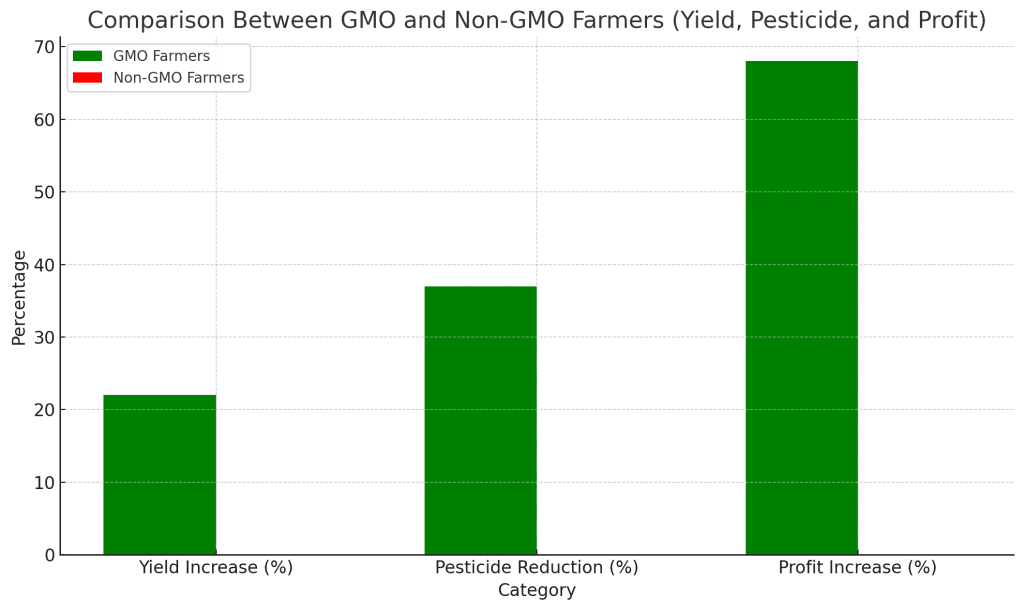
The debate over genetically modified organisms (GMOs) is driven by fear, misinformation, and political agendas, especially in regions like the European Union (EU). Despite overwhelming scientific consensus that GMOs are safe and beneficial, public opposition persists, often rooted in superstition rather than facts.
In this article, we’ll explore the myths surrounding GMOs, the real-world damage caused by banning them, and the sustainability they offer.
The Role of Superstition and Misinformation
Opposition to GMOs often stems from fears of the unknown and the belief that GMOs are “unnatural” or unsafe. A Pew Research Center survey from 2015 found a significant gap between scientists and the public on GMO safety: 88% of scientists from the American Association for the Advancement of Science (AAAS) agree that GMOs are safe, while only 37% of the public holds this view (American Enterprise Institute). Public mistrust is fueled by media misinformation, misconceptions about health risks, and the perception that GMOs are part of a corporate agenda.
Superstition fuels the war on GMOs, not science. Put down the pitchforks and dig into Frankenfoods https://t.co/41OESh24AS
— Channa Prakash (@AgBioWorld) October 9, 2024
Contrary to these fears, GMOs have undergone rigorous testing. A review by the National Academies of Sciences examined over 900 studies and concluded that GMOs are as safe as conventional crops (JAMA Network). Major health organizations like the World Health Organization and the US Food and Drug Administration confirm this finding (Pew Research Center) (Purdue University). The myths associating GMOs with cancer or environmental harm have been repeatedly debunked through extensive research.
Data That Disproves Anti-GMO Myths
Myth 1: GMOs Are Unsafe for Consumption
Numerous large-scale studies have shown no link between GMOs and adverse health effects. For example, a review published in Critical Reviews in Biotechnology (2014) examined over 1,700 studies conducted over two decades. The analysis confirmed no harmful health effects from GMOs in humans or animals. Additionally, a European Commission study spanning 25 years and involving 500 independent research groups concluded that GM crops are no more dangerous than conventional crops .
Myth 2: GMOs Increase Pesticide Use
One common argument against GMOs is that they lead to increased pesticide use, but the data shows the opposite for many crops. According to a study by PG Economics (2016), the adoption of GM crops led to a 37% reduction in pesticide use globally between 1996 and 2014. An example is Bt cotton, genetically engineered to produce a natural insecticide from the bacterium Bacillus thuringiensis. This modification reduces the need for chemical pesticides. In India, farmers growing Bt cotton have reported significantly reduced pesticide applications, saving on costs while boosting yields .
Myth 3: GMOs Are a Corporate Tool to Control Food
Another misconception is that GMOs only benefit large corporations like Monsanto. However, the opposite is true in many developing countries. A meta-analysis in PLOS ONE (2014) found that GM crops increased yields by 22% and farmer income by 68%. For instance, in South Africa, the introduction of GM maize has boosted smallholder farmers’ productivity by reducing crop losses from pests. The benefits of GMOs extend beyond large corporations, particularly helping small-scale farmers who rely on increased yields and reduced input costs to sustain their livelihoods .
Political and Economic Agendas Behind GMO Bans
In regions like the EU, the political agenda behind GMO bans is not solely based on science but also on public sentiment, environmental lobbying, and economic interests. Many European consumers are wary of GMOs, and the EU has adopted a precautionary principle in its regulatory framework. This principle allows bans and restrictions on GMOs despite a lack of scientific evidence demonstrating harm.
Farmers and food producers in Europe, particularly in France and Germany, have a strong interest in maintaining non-GMO markets. Organic and conventional farmers often argue that widespread adoption of GMOs would undermine their ability to sell premium non-GMO products at higher prices. Protecting local agricultural markets from competition with GMO-producing countries, especially the U.S., is also a political and economic priority.
Environmental groups exert significant political pressure as well, advocating against GMOs based on concerns over biodiversity and ecosystem health. These concerns, while often overstated, have succeeded in influencing policy, leading to delays in GMO approvals or outright bans (AAEA).
The Damage Caused by Banning GMOs
The bans and restrictions on GMOs have far-reaching consequences, from economic losses to environmental degradation and public health challenges.
Environmental Impact
Without GMOs, agriculture becomes less efficient, requiring more land to grow the same amount of food. This leads to deforestation, habitat destruction, and increased carbon emissions. A study by Purdue University found that a global ban on GMOs would increase cropland by 7.7 million acres to make up for the lower yields of conventional crops. This would result in the release of an additional 0.92 billion tons of carbon dioxide into the atmosphere, significantly worsening climate change.
In contrast, GM crops like herbicide-resistant and insect-resistant varieties help farmers practice no-till farming, which conserves soil quality and reduces greenhouse gas emissions.
Economic Impact
A ban on GMOs would also drive up food prices and reduce agricultural productivity. In the U.S., a ban could cost the economy between $200 million and $4.9 billion annually, while globally, food prices could rise by as much as 2.2%. The poorest regions of the world would be the most affected, as they spend a much larger portion of their income on food compared to wealthier countries.
Countries that rely on food imports, such as China, would suffer disproportionately. A GMO ban in these regions could result in a welfare loss of $3.63 billion, severely impacting the ability of these nations to feed their populations.
Health Consequences
GMOs offer significant health benefits, especially in developing countries. Crops like Golden Rice, which is fortified with vitamin A, have the potential to combat malnutrition and prevent diseases such as blindness and stunting. By banning GMOs, countries restrict access to these biofortified crops, exacerbating health problems that are preventable through better nutrition.
Moreover, GM crops like insect-resistant varieties can reduce the levels of harmful toxins, such as aflatoxins, in the food supply. Aflatoxins are known to cause liver cancer and are prevalent in poorly stored crops in developing countries. GMOs can help mitigate this risk by reducing fungal infestations.
The Sustainable Potential of GMOs

Despite the controversies, GMOs provide several key sustainability advantages that can address food security and environmental concerns.
- Higher Yields on Less Land: GMOs allow farmers to produce more food on less land, reducing the pressure on forests and natural habitats. According to Brookes and Barfoot, without GM crops, farmers would have needed an additional 25 million hectares of land to achieve the same yields from 1996 to 2018.
- Reduced Pesticide Use: GM crops like Bt corn and cotton are engineered to produce a natural insecticide, reducing the need for chemical pesticides. In India, the adoption of Bt cotton led to a 50% reduction in pesticide use, benefiting both farmers and the environment.
- Drought Resistance: In regions affected by climate change, such as sub-Saharan Africa, GM crops like drought-tolerant maize help farmers maintain productivity despite erratic weather patterns. These crops require less water, making them essential for food security in water-scarce regions.
Moving Beyond Superstition and Embracing Science
The opposition to GMOs, particularly in the EU, is driven by a combination of superstition, public skepticism, and political interests rather than science. Banning GMOs not only leads to higher food prices and environmental damage but also prevents the world from addressing pressing challenges like malnutrition and climate change.
It is time to move beyond unfounded fears and embrace the scientific consensus that supports the safety and sustainability of GMOs. Policymakers must focus on evidence-based regulations that allow for the responsible use of GMOs to benefit both people and the planet.
For further reading, visit resources from Pew Research Center, Purdue University, and CAST.
